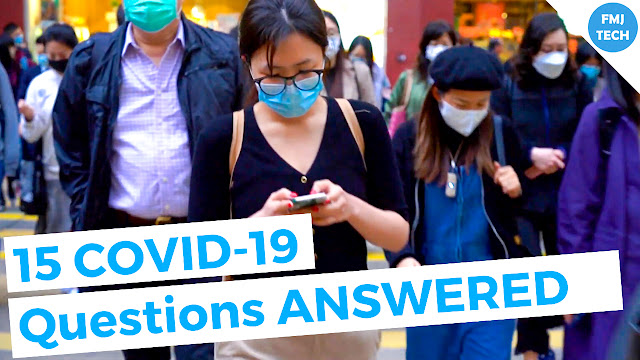 |
15 Most Asked COVID-19 Questions ANSWERED
|
Experts are still learning about the coronavirus (COVID-19). With new information coming out every day, it can feel overwhelming at times. Here are the answers to 15 most asked COVID-19 questions. I always suggest you guys go through the WHO official website for newly updated news. So, let's start with the questions.
15. What are the symptoms of Covid 19?
Symptoms vary from person-to-person. It may produce few or no symptoms.
Common symptoms include Fever, dry cough, and difficulty in breathing
It may take 2–14 days for a person to notice symptoms after infection.
14. How does it spread?
It primarily spreads between people through respiratory droplets produced when an infected person coughs or sneezes.
You can also get coronavirus by touching infected surfaces, then touching your mouth, eyes or nose.
13. How long does coronavirus stay “alive” on surfaces?
Up to three days, depending on the surface.
The new coronavirus can survive up to 72 hours after being placed on stainless steel and plastic.
It can survive up to four hours after being placed on copper, and up to 24 hours after being put on cardboard.
In aerosols, it survives for three hours.
12. Why is the disease called COVID-19?
In COVID-19, ‘CO’ stands for ‘corona,’ ‘VI’ for ‘virus,’ and ‘D’ for the disease. Formerly, this disease was referred to as “2019 novel coronavirus”
On Feb.11, the World Health Organization announced this official name Covid 19
11. Is there a cure? Why is it taking so long?
There’s currently no cure for the novel coronavirus. And while research is underway, it could be more than a year before a vaccine becomes available.
10. Why the Health department isn’t testing many people for the coronavirus?
The tests, labs, and equipment necessary to run tests for COVID-19 are limited. Production is ramping up, though
9. Can we kill it by inhaling boiling water steam? Like in India they use this during flu and cold or cough.
The WHO says this will not work to kill a virus that’s already entered your body.
8. How do you know someone is recovering from coronavirus?
If a patient is recovered from coronavirus, the patient has to be free and clear of any symptoms. Then, the patient has to have a negative test result for the virus and then be tested again in 24 hours. After the patient tests negative both times, they are considered recovered.
7. Is coronavirus especially harmful to pregnant women?
Long story short: There’s not enough data yet, considering this coronavirus just emerged in humans a few months ago.
6. Does donated blood get infected by the coronavirus?
“Individuals are not at risk of COVID-19 through the blood donation process or via a blood transfusion since respiratory viruses are generally not known to be transmitted by donation or transfusion,” said the American Association of Blood Banks.
5. What if I do have some of the symptoms? Like a cough and sore throat? No fever. No runny nose. Do I have to go to a doctor or call the health department?
No, do not go to the doctor. You are considered low risk. Low to moderate risk patients are not being tested for Covid-19 at this time. Self-quarantine is recommended until tests become available, but contact your local primary care provider for guidance.
4. Can I get coronavirus from my pet, or vice versa?
“No. There is no evidence that companion animals or pets such as cats and dogs have been infected or could spread the virus that causes Covid-19,” According to the World Health Organization
3. Is it true that COVID-19 does not like warm/ hot weather?
Officials at the WHO said on March 5 that there is no reason to believe temperature will play a role in the Covid-19 outbreak.
2. Can I have the flu and coronavirus at the same time? If I test positive for the flu, does that mean I don’t have coronavirus?
There’s no reason why you can’t have both the flu and coronavirus. So a positive test for the flu doesn’t mean you can’t have coronavirus as well.
1. Can bugs and or insects carry the virus?
COVID-19 is new and there are a lot of unknowns. However, the health department said they do not believe insects will carry this virus. They make this prediction based on how other viruses in the Coronavirus family act.




















